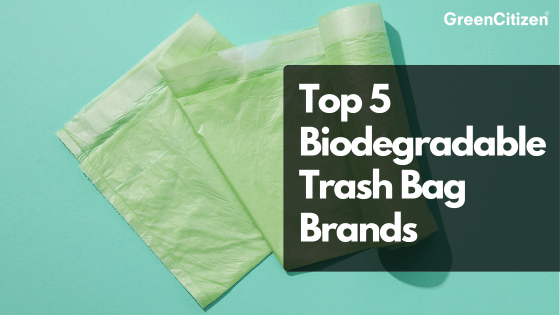Biodegradable trash bag labels are everywhere, but the hard part is figuring out which ones are actually sustainable and which ones are just greenwashed plastic in a greener outfit.
If you’re new to biodegradable and compostable trash bags, the confusion is normal: some “biodegradable” bags still leave microplastics, and some only break down in industrial composting facilities, not in your backyard compost.
This guide solves both problems. First, you’ll learn how to identify a truly compostable, low-toxicity bag by checking the right certifications (like BPI Certified Compostable and TÜV Austria OK Compost), the materials (PLA, PBAT, starch-based bioplastics), and the red flags (like oxo-degradable claims).
Then we’ll break down five biodegradable trash bag brands that back up their sustainability promises with real standards, responsible sourcing, and everyday performance, from kitchen scraps to pet waste.
Quick Takeaways: How To Choose Biodegradable Trash Bags
To avoid greenwashing, choose a biodegradable trash bag that is certified compostable, clearly labeled for home or industrial composting, and made from plant-based materials. Skip bags with vague “eco-friendly” claims and no third-party standards.
- Trust certifications, not adjectives. Look for BPI (U.S.) or OK Compost (TÜV Austria).
- Match the bag to your disposal reality. Home compost and industrial compost are not the same.
- Avoid “oxo-degradable.” It often breaks into plastic fragments rather than becoming compost.
- Pick based on use case. Kitchen scraps, yard waste, and pet waste need different sizes and strength levels.
- Landfill is not the goal. Compostable materials in landfills can generate methane in low-oxygen conditions.
How We Chose These Biodegradable Trash Bag Brands
We selected biodegradable trash bag brands that back sustainability claims with third-party compostability certifications, transparent materials, and disposal guidance that supports real composting systems instead of vague biodegradability promises.
We prioritized brands and product lines that demonstrate:
- Third-party compostability proof (e.g., BPI, OK Compost Home/Industrial, ASTM D6400 / EN 13432 compliance)
- Material transparency (plant-based polymers like PLA, PBAT, starch-based bioplastics, and clearly stated resins such as Mater-Bi®)
- Lower greenwashing risk (no reliance on “oxo-degradable” positioning or ambiguous “breaks down anywhere” claims)
- Use-case practicality (bags that are sized and built for real-world organics collection, not just marketing photos)
Top Biodegradable Trash Bag Brands for Sustainable Homes
1. BioBag
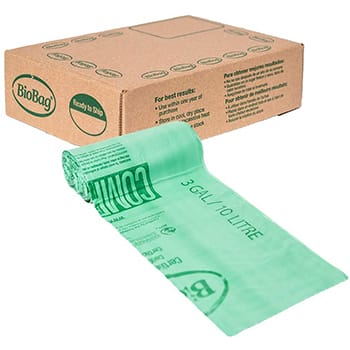
What Makes BioBag Stand Out?
BioBag is a trailblazer in the biodegradable plastics industry, founded with one goal—help the planet breathe easier. Their mission is all about replacing polyethylene-based plastics with compostable alternatives made from renewable resources. As a brand, BioBag believes convenience shouldn’t come at the cost of the Earth, and they work hard to make composting a mainstream habit.
Sustainable Practices and Manufacturing
BioBag’s manufacturing processes are driven by transparency and trust. Their products are made from Mater-Bi®, a compostable resin derived from corn starch and other renewable crops. Most of their products are certified compostable by BPI and TÜV Austria, making them fully compliant with ASTM D6400 and EN 13432 standards. Even their packaging is minimal and plastic-free, keeping waste low from start to finish.
How BioBag Reflects Their Sustainability Ethos
BioBag trash bags are truly biodegradable in both industrial and home composting environments. Unlike “oxo-degradable” bags, BioBag products break down completely without leaving microplastics behind. Their lineup includes food waste bags, yard waste liners, and pet waste bags—each designed to help households and businesses reduce their carbon footprint while managing organic waste cleanly and efficiently.
Should You Trust BioBag?
With decades of compostable innovation and global certifications backing their products, BioBag is a reliable ally for eco-conscious consumers. Their commitment to non-toxic, renewable, and ethically sourced materials makes them a solid choice if you’re looking to ditch traditional plastics for something truly green.
2. UNNI
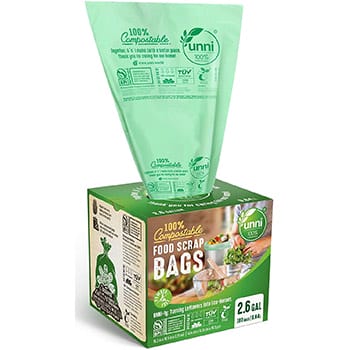
What Makes UNNI Stand Out?
UNNI, a San Francisco company, is laser-focused on creating compostable alternatives to traditional plastics, with the mission to reduce pollution and encourage sustainable living. UNNI believes that every household can make an impact, and they’re here to make that choice easier with bags that are kind to the planet.
Sustainable Practices and Manufacturing
UNNI’s biodegradable trash bags are crafted from plant starches and are 100% certified compostable. They meet strict standards like ASTM D6400, EN 13432, and are certified by BPI (Biodegradable Products Institute) and OK Compost Home by TÜV Austria. This means their products break down naturally in both home and industrial composting environments—leaving zero toxic residue behind. Plus, their production facilities follow eco-friendly processes that limit emissions and waste.
How UNNI Reflects Their Sustainability Ethos
UNNI’s biodegradable trash bags are more than just plastic-free—they’re a complete rethink of what a trash bag can be. They offer a wide range of sizes, from food scrap liners to large compostable bin bags, all designed to handle everyday use without compromising performance. Unlike “greenwashed” alternatives, these bags don’t just degrade—they actually compost, helping return organic matter back to the soil.
Should You Trust UNNI?
Absolutely. UNNI backs up their mission with third-party certifications, high-performance products, and a consistent track record of sustainability. For eco-conscious shoppers who want functionality and planet-friendly packaging, UNNI is a dependable go-to.
3. Stout
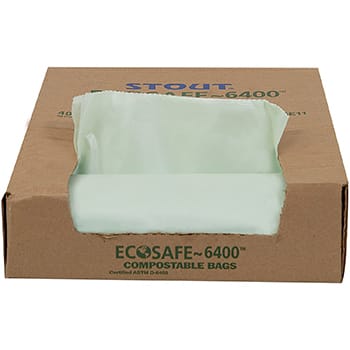
What Makes Stout Stand Out?
Stout is a go-to name for heavy-duty waste solutions that don’t compromise the planet. While they may not be a household eco-brand, they’ve carved a niche in the commercial and municipal waste sector with compostable products that meet rigorous standards. Backed by parent company Heritage Bag, Stout’s mission revolves around practical sustainability—offering reliable alternatives to petroleum-based plastics in high-demand environments.
Sustainable Practices and Manufacturing
Stout’s Envirosense® compostable trash bags are manufactured with sustainability front and center. These bags are made from plant-based biopolymers and are fully BPI-certified compostable, complying with ASTM D6400 standards. Their products are designed to break down in commercial composting systems, leaving behind zero toxic residue. Stout focuses on large-scale waste diversion, supporting LEED-certified building initiatives and green waste programs across North America.
How Stout Reflects Their Sustainability Ethos
Stout’s biodegradable trash bags are all about performance without pollution. Designed for both residential use and bulk commercial needs, their bags are durable, tear-resistant, and break down naturally under composting conditions. These aren’t your average flimsy “eco” bags—Stout builds theirs to handle real waste, making them ideal for food services, schools, and green-certified businesses aiming to meet local composting laws.
Should You Trust Stout?
Definitely—especially if you’re managing large volumes of organic waste. Stout’s bags may fly under the consumer radar, but they’re trusted by cities and businesses aiming for zero-waste operations. If you’re looking for certified compostable strength in bulk, Stout delivers with sustainability and scale.
4. Duro
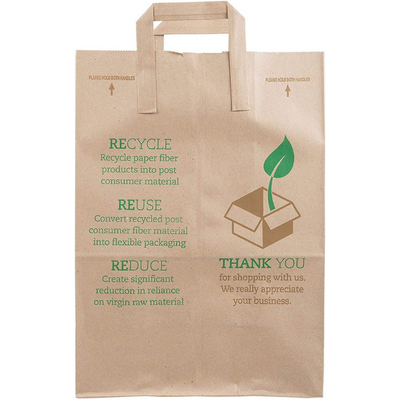
What Makes Duro Stand Out?
Duro is a heritage packaging brand with a strong presence in the paper bag manufacturing world, and they’ve been in the game for decades. While not exclusively a “green brand,” Duro has taken significant steps toward sustainable innovation by prioritizing recyclable and compostable paper products. With a focus on functionality and scalability, Duro bridges the gap between traditional packaging and responsible alternatives.
Sustainable Practices and Manufacturing
Duro’s manufacturing process centers on using responsibly sourced kraft paper, much of which contains post-consumer recycled content. Their paper bags are fully recyclable, compostable, and often meet SFI (Sustainable Forestry Initiative) standards for sustainable wood sourcing. Unlike plastic alternatives, Duro bags are free from toxins and microplastics, and their U.S.-based production reduces transportation emissions. The company has also worked to improve energy efficiency and waste reduction in its manufacturing facilities.
How Duro Reflects Their Sustainability Ethos
Duro’s trash bags and commercial liners—yes, they make paper-based trash solutions too—are designed for eco-conscious businesses and municipalities that want to cut plastic out of their waste stream. Their products are plastic-free, biodegradable, and hold up well for dry waste and compost collection. While they’re not ideal for wet or greasy contents, they’re a perfect low-impact solution for general household or retail use.
Should You Trust Duro?
If you’re looking for a reliable alternative to plastic trash liners, especially for light-duty or compost-friendly waste, Duro is a solid bet. With a long-standing reputation, eco-forward material sourcing, and recyclable packaging, they’re helping bring paper back into the sustainability spotlight—where it belongs.
5. Doggy Do Good
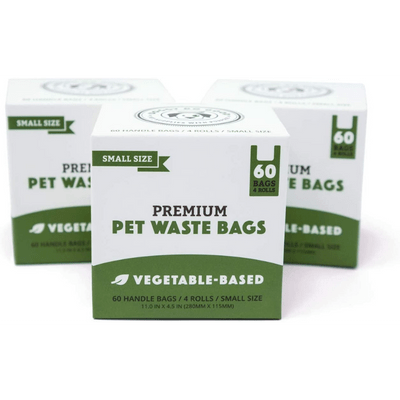
What Makes Doggy Do Good Stand Out?
Doggy Do Good is more than just a clever name—it’s a mission. This family-owned brand is built around a simple yet powerful goal: make pet care more sustainable. From the very beginning, their core values have centered on animal welfare, environmental responsibility, and giving back to the planet. Every purchase supports rescue shelters and tree-planting initiatives, making them a standout in the pet waste category.
Sustainable Practices and Manufacturing
Doggy Do Good sets a high bar for eco-ethical manufacturing. Their pet waste bags are made from plant-based resins, including corn starch and other renewable crops. Certified OK Compost Home and ASTM D6400, these bags are safe for both home and industrial composting. Plus, their packaging is 100% recycled and recyclable, and the entire supply chain emphasizes cruelty-free, toxin-free, and plastic-free production. The brand even offsets its carbon footprint with climate-positive practices.
How Doggy Do Good Reflects Their Sustainability Ethos
Unlike many “eco-friendly” pet bags that quietly contain plastic, Doggy Do Good’s bags fully break down without leaving behind microplastics. They’re thick, leak-proof, and unscented—proving that you can handle pet waste without harming the planet. And they don’t stop at poop bags—they also offer compostable wipes and bamboo grooming products that align with their zero-waste vision.
Should You Trust Doggy Do Good?
Absolutely. Doggy Do Good walks the talk—literally. With compostable materials, charitable giving, and low-impact packaging, they’re the perfect pick for eco-conscious pet parents. Supporting them means making your dog’s daily business part of a bigger environmental mission.
Biodegradable Trash Bag Brand Comparison (Quick Guide)
| Brand | Best For | Composting Fit | Key Signals To Look For |
|---|---|---|---|
| BioBag | Food scraps, organics | Home + Industrial (varies by product) | Mater-Bi®, BPI, TÜV Austria |
| UNNI | Household organics | Home + Industrial (varies by product) | BPI, OK Compost Home |
| Stout | Bulk/commercial organics | Industrial compost | BPI, ASTM D6400 |
| Duro | Dry/light-duty waste | Compostable paper (use-case dependent) | Responsible kraft paper sourcing |
| Doggy Do Good | Pet waste | Home + Industrial (varies by product) | OK Compost Home, ASTM D6400 |
Note: Always match the bag to your local compost acceptance rules and your waste type (wet/heavy vs dry/light).
What Are Biodegradable Trash Bags?
A biodegradable trash bag is a waste liner made from plant-based materials (bioplastics) like corn starch, sugarcane, or PLA. Unlike traditional plastic, these bags decompose into natural elements—biomass, water, and CO2—when exposed to bacteria and fungi, effectively reducing landfill waste and microplastic pollution.
Biodegradable trash bags are waste bags made from plant-based or bioplastic materials that break down under certain environmental conditions. Unlike traditional plastic bags made from fossil fuels, biodegradable options can decompose into simpler compounds over time.
However, the word “biodegradable” is often used loosely, so it’s important to confirm how the bag breaks down and what it leaves behind.

Read More:
What Are Compostable Trash Bags?
Compostable trash bags are a specific sub-category of biodegradable bags certified to break down completely in composting environments within a set timeframe (usually 90–180 days). They meet strict standards like ASTM D6400 and leave behind zero toxic residue, creating nutrient-rich soil for gardening.
Compostable trash bags are typically made from renewable plant-based materials, such as corn starch or sugarcane-derived polymers, and are designed to break down completely in a composting environment.
A truly compostable bag should become indistinguishable from finished compost over time, without leaving toxic residues or microplastic fragments.
What Certifications to Look for When Buying Compostable Trash Bags
The most reliable way to verify a compostable trash bag is to check for BPI Certified Compostable or TÜV Austria OK Compost (Home or Industrial). These confirm the bag meets recognized compostability standards rather than relying on marketing claims.
Here’s a beginner-friendly decoding guide:
BPI Certified Compostable
A strong U.S. signal that a product meets compostability requirements aligned with standards like ASTM D6400 (and related requirements depending on product type).
TÜV Austria OK Compost (Home vs. Industrial)
- OK Compost Home: Designed to break down in home compost conditions (cooler, less controlled).
- OK Compost Industrial: Designed for commercial composting systems with controlled heat, moisture, and aeration.
Compostable Vs. Biodegradable Garbage Bags: The Real Difference
The main difference is certification and breakdown environment. While all compostable bags are biodegradable, not all biodegradable bags are compostable. “Biodegradable” simply means it breaks down eventually, sometimes leaving microplastics. “Compostable” guarantees the bag will decompose into non-toxic organic matter under specific conditions, verified by certifications like BPI.
A lot of people think that biodegradable garbage bags are automatically compostable. But you have to be very careful to understand the difference between compostable and biodegradable bags.
All compostable bags are biodegradable, but not all biodegradable ones are compostable.
See, there are certain types of plastics made from petrochemicals that will break down in certain conditions.
But they break down into their chemical elements, and you don’t want those in your compost. This is one area where there is a lot of greenwashing to fool people into thinking they are buying something that is good for the environment.
What I suggest you do is focus on bags for composting as much as you can. They won’t be suitable for all types of waste. But for most of what a typical household needs to get rid of, they are going to work just fine.
How to Dispose of Biodegradable or Compostable Trash Bags
Biodegradable trash bags containing food scraps should be placed in a home compost bin or a municipal green bin, provided they are certified compostable. Do not place them in standard recycling bins, as they contaminate the recycling stream. If the bag is not certified compostable, it must go in the general landfill trash.
Let me start with biodegradable garbage bags. I already mentioned above that these aren’t exactly the green solutions you should be looking for as they are often made using petrochemicals, and they don’t break down into safe materials.
Such biodegradable ones are really only suitable for trash that isn’t going in your compost or recycling bin. You definitely don’t want to use them for compostable food waste, whether you have your own compost pile or you bring it to a community service.
But you also have to be careful what you do with a compostable trash bag.
Some people falsely believe that they are fine for household waste hat goes to a landfill. But there is a big downside. When compostable materials end up in an oxygen-free environment like a landfill, then the breakdown will release methane, which is a potent greenhouse gas.
On the positive side, if the wind were to blow one of these bags away from a landfill, then they would do a lot less damage to the environment in the long term.
Still, it’s not the best option.
What you should use these trash bags for is collecting compostable food and garden waste. Those are the plant-based scraps from your kitchen and any plant clippings that you might want to gather up.
You can then simply add the collected waste, including the bag, to your own composter if you have one. Whether that’s a pile at the end of your garden or a container to keep things tidy, the bags should be unidentifiable after a month or two.
You can also use these bags if you drop compostable waste off at a community center or if your waste management company collects it.

Read More:
How to Choose a Biodegradable Trash Bag
When choosing a biodegradable trash bag, look for third-party certifications (BPI, TUV Austria) to ensure compostability. Check the thickness (mil) for durability, verify the material is plant-based (starches vs. petroleum), and ensure the size fits your specific bin (e.g., 3-gallon for kitchen scraps, 13-gallon for tall bins).
When it comes to choosing biodegradable garbage bags, there are a few characteristics that you need to focus on in order to make sure you have the right ones.
It’s also likely that you’ll need more than one type depending on how many you use and what sizes you need.
Size
The first thing you need to check out with compostable garbage bags is the size. It will usually be listed in gallons, but you can also take a closer look at the dimensions in inches.
For a small bin where you collect food waste in your kitchen, a two to three-gallon bag will work just fine. But if you want to collect larger amounts of stuff in your garden, then I suggest you look for a trash bag size over 25 gallons.
Durability and Thickness
One of the big problems, even with some of the best biodegradable garbage bags, is that they often aren’t as durable as plastic trash bags. But, in my experience, the quality and durability in recent years have improved a lot.
What I suggest you do is read online reviews to see what customers are saying about how easily they tear.
Materials
The main thing to look out for is that the materials are plant-based and will fully decompose. There are some companies that use greenwashing techniques to make chemical-based conventional trash bags sound eco-friendly.
But with all the best compostable trash bags listed above, you’ll make a safe choice.
Compostability
As mentioned above, not all biodegradable materials are also compostable. What you need to look out for are plant-based compostable materials like corn, sugarcane, and other starches.
These are materials that you can throw into your garden compost.
Use Case
Personally, I have three different compostable and eco-friendly bags. I have one small type for collecting food in the kitchen, a larger 30-gallon one for garden waste, and another type that we use for bringing dogs on a walk.
Certifications
One important thing to look out for is what type of certification you can see on trash bags. Sometimes, companies greenwash their products with self-sponsored certifications. But what you need to look out for are industry and government certifications that you can trust.
Brand Ethics
And finally, the best compostable trash bags we put together above all come from trusted eco-friendly brands. These aren’t companies that have created one type of compostable trash bag alongside dozens of plastic-based ones.
Frequently Asked Questions (FAQ)
Yes, biodegradable trash bags work if you dispose of them under suitable conditions. These bags require air, moisture, and light to decompose. If they are placed in a landfill, they may take as much time to decompose as regular bags.
Biodegradable bags take 3 to 6 months to decompose. The duration of decomposition can change depending upon factors like the production process, moisture in the air, and temperature. That said, some biodegradable plastics can take much longer if the conditions aren’t right.
You can use reusable bags instead of trash bags. You can also line your trash can with newspaper, and buy packaging-free produce like fish and cheese. While I recommend going with biodegradable or compostable trash bags, you can also use the trash can as it is. Just wash the can after use.
The problems with biodegradable plastics are: they produce methane gas when they break down, they produce toxic byproducts such as microplastics upon degradation, it takes quite a while for them to decompose completely, they are almost impossible to recycle, and the use of agricultural land to produce raw materials (like corn starch) that are used to make them can potentially drive food prices up.
Yes, biodegradable bags are better than plastic because they can decompose within 3 to 6 months. Take note though that the decomposition process requires favorable conditions to work optimally. Compostable bags, on the other hand, are fully biodegradable. They decompose in a home environment, making them perfect for domestic use. They are a better choice than normal plastic ones.
No, you cannot put biodegradable bags in the green bin. The green bin is only for recyclable things. These bags are not recyclable. Not only this, but they can also interfere with the recycling procedure of eligible materials. So, these trash bags, biodegradable as they are, shouldn’t still be put in the green bin as they can ruin a whole batch of recyclable materials.
You cannot put biodegradable bags in the recycling bin. They are not recyclable. And because they are not recyclable, they should be placed in the black/grey bin. Biodegradable trash bags are characterized as residual waste. So, they are either thrown off in a landfill or used as an energy source.
Kitchen bags are not recyclable. These bags cannot be processed at the recycling facilities. Ultimately, the bags end up in landfills. Therefore, put the kitchen trash holders in the grey/black trash cans when you are done with them.
Final Take: Choosing Brands That Don’t Trash the Planet
Biodegradable trash bags are more than just compost bin liners—they’re a statement about the kind of future we want. But choosing a truly eco-friendly product means choosing a brand that prioritizes people, planet, and performance.
Each of the brands we explored—BioBag, UNNI, Stout, Duro, and Doggy Do Good—offers more than biodegradable claims. They bring transparency, third-party certifications, and sustainable manufacturing to the table. Some focus on home composting, others on commercial-scale waste reduction. Some support animal shelters, others improve forestry practices. But all have one thing in common: they’re creating real alternatives to traditional plastic.
So when it’s time to take out the trash, make sure your trash bag isn’t trashing the Earth.
